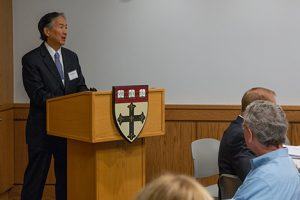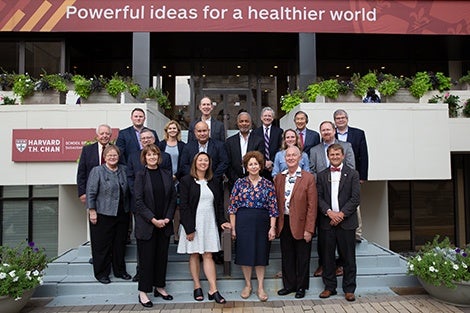November 2, 2018 – Is a health background important for taking on a job as a top state health official? Yes, but it’s far from the only thing. Other key skills include knowing how to manage a big organization, set and stick to a budget, partner with other stakeholders and agencies, communicate with the press, and cultivate good working relationships with both the governor and other state leaders.
“These jobs are all-consuming and all-encompassing,” says Howard Koh, who served as Commissioner of the Massachusetts Department of Public Health from 1997-2003 and as Assistant Secretary for Health for the U.S. Department of Health and Human Services from 2009-2014. “They test you to your core.”
Koh, Harvey V. Fineberg Professor of the Practice of Public Health Leadership at Harvard T.H. Chan School of Public Health and Harvard Kennedy School, spearheads a Harvard Chan program aimed at training newly appointed state or territorial health officials (“SHOs”) to prepare for their demanding roles—the sort of training that was unavailable when Koh started his government service career after working as a clinician, teacher, and researcher. Robert Blendon, Richard L. Menschel Professor of Public Health and Professor of Health Policy and Political Analysis at Harvard Chan School and Harvard Kennedy School, co-led the program.
In mid-August, the Harvard Chan program—which Koh and Blendon hope will become an annual event—drew 18 incoming SHOs from around the country and featured Harvard faculty, former state health officers, and other experts from the field discussing topics such as how to work with a governor, strategic budgeting, and planning for emergencies. The program was funded by the Association of State and Territorial Health Officials (ASTHO).
“When the day begins, you don’t know how it will end”
The need for training is “tremendous,” said Koh. “When state or territorial health officials are appointed, they’re often plucked out of academia or other fields and placed on a public stage to run large complex organizations with multimillion-dollar budgets,” Koh said. “Few have the experience to assume that level of responsibility. However, with some education and training, those who answer the call can become stronger leaders and more effective public servants.”
Koh said he found that in leading major government agencies and initiatives, “When the day begins, you don’t know how it will end. You may have planned activities but inevitably something unforeseen happens that completely disrupts your day. To be successful, you have to stay committed to long-term goals while remaining flexible and resilient in the short term. And resources are a constant challenge as the needs are always great,” he said.
Koh’s experience also taught him that it’s crucial for health officers to build relationships with partners in multiple government agencies. “Particularly in a time of crisis, you need the whole system working together on behalf of public health. That’s when effective leadership can help align people you don’t directly manage or oversee,” he said.
Koh acknowledged both the challenges and opportunities of working in government. “While exhausting, these jobs are also exhilarating and deeply rewarding,” he said. “In terms of living a mission-driven life, there’s really nothing else that compares.”

Bonding with peers
Koh gave two presentations during the two-and-a-half-day program—one on leading in a state health department and the other on communicating to the media. The program also included two former governors, Ted Strickland of Ohio and Steven Beshear of Kentucky. Timothy Johnson, former chief medical editor at ABC News, shared insight on how to stay on message, be succinct, and convey a warm and empathic tone when giving an on-camera interview. Mary Selecky, clinical professor of health services at the University of Washington School of Public Health and Washington’s Secretary of Health from 1998-2013, discussed how to deal with environmental health crises. John McDonough, professor of the practice of public health at Harvard Chan School, discussed how to work with a state legislature. Richard Serino, distinguished visiting fellow at Harvard Chan School’s National Preparedness Leadership Initiative and former deputy administrator for the Federal Emergency Management Authority, taught how public health officials should prepare for emergencies. Several other guest speakers addressed issues such as working with Congress, budget and insurance challenges, and the opioid crisis.
Meeting their counterparts from other states provided program attendees with a unique support network. Randall Williams, director of the Missouri Department of Health and Senior Services and a participant in the program, called it “very practical and helpful” and said the faculty were outstanding. He added, “I think there is great value in being with colleagues and peers as you learn together collaboratively.”
photos: Nilagia McCoy
